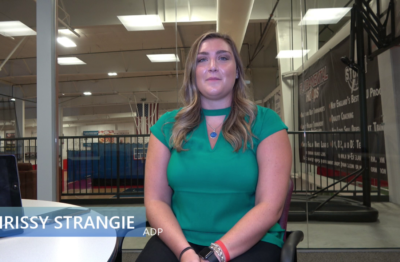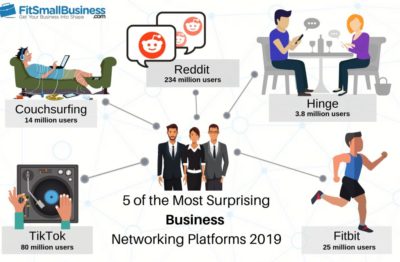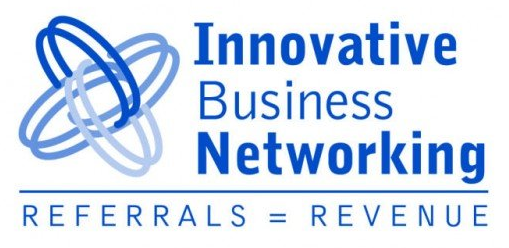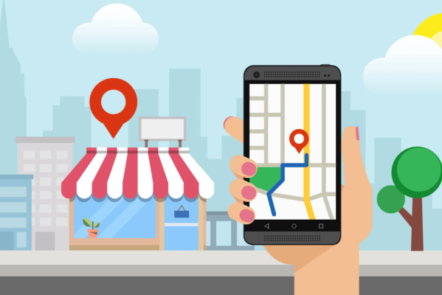Top Posts

18.09.2019
IBN
video

15.10.2019
IBN
post

04.09.2019
IBN
post
01.08.2019
IBN
video
1. Take every opportunity to meet new people.
“The most important lesson I’ve learned in networking (and which I wish I’d known years ago) is to take every opportunity possible to meet new people. Don’t dismiss a single soul—you never know who you’re talking to, who they might know, or how they might be able to contribute. As my father always told me as a kid, ‘It’s not what you know, it’s who you know.’ That statement has proven so true, especially in a business networking setting.” —Lori Cheek, founder and CEO of Cheekd and Networkd2. Focus on how you can help.
“People often go to networking events seeking individuals who can help them. But I think this is the wrong approach: Networking is all about helping others. Engage in meaningful conversation, share your interests, and see how you can offer your resources to the other party.” —Anayet Chowdhury, cofounder of ArgoPrep3. Go alone.
“I find that it’s best to go to networking events alone so you’re forced to talk to new people. I also think it’s wise to do your homework in advance. If the attendee list is publicized, make note of who you’d like to meet beforehand. It may seem scary to go on your own, but remember that everyone is there for the same reason—they all want to make new connections. So don’t be shy; just walk up and introduce yourself! The only thing you have to lose is an opportunity.” —Lori Cheek4. Don’t forget your business cards.
“Never, ever leave home without your most essential, ‘old-school’ networking tool: Your business card. Even in the digital age, business cards are still the single fastest way to share who you are, what you do, and how you can be contacted.” —Lori Cheek5. Find a community.
“An easy way to find your tribe is to take classes. I particularly like attending General Assembly classes. Many are free, and they’re typically populated with knowledgeable teachers who are willing to help you troubleshoot beyond the classroom, as well as other experienced business owners in your industry.” —Orion H. Brown, Founder and CEO of The Black Travel Box6. Be sure to meet people in other industries, too.
Sticking with what you know has its place, but meeting people from other industries can be highly rewarding for your business and career. We’re an ed-tech industry, but we’ve recently invested in and partnered up on amazing projects in the entertainment industry after meeting impressive individuals at networking events.” —Anayet Chowdhury7. Make a networking goal, and stick to it.
“Find networking events through your local Chamber of Commerce website, Business Network International, Board of Trade, industry associations, Facebook events, and more. Start by setting a goal of going to one networking event per month. Hold yourself to it, regardless of how badly you may not want to go the day of the event! I set up Meetup.com as my default homepage on my internet browser so I can regularly keep my eye on upcoming events. This simple trick has helped me attend networking events more regularly.” —Mazdak Mohammadi, owner and founder of blueberrycloud8. Outline your objectives and target networking audience.
“In the early stages of my business, I was fumbling with networking and obtaining leads. But then I thought: I have a business plan and a marketing plan—so why not draft a strategic networking plan? I outlined my objectives, my target networking audience, the type of events I wanted to go to, and a budget. I encourage anyone, especially those going through a career transition, to create a networking plan. It’ll help you navigate that new environment with purpose.” —Michelle Ngome, founder of Line 25 Consulting9. Network with your customers.
“Put yourself wherever your customer is, whether that’s networking in person at trade shows, or virtually through online forums or social media. Either way, connect with your customers on their home turf and hear them out on their pain points. That way, you can better design your business or service to solve those problems.” —Erica Wassinger, cofounder of The Startup Collaborative10. Ask for introductions.
“People you already know can be the best resource for meeting new people in your industry. I typically send an email to 50-100 people already on my list, bcc everyone, and just write from the heart—I ask for feedback, make announcements about my business, or just plain catch up on the latest thing I’m working on. And always end your note with an ‘ask.’ I shamelessly plug that I’m looking for funders, product developers, and word-of-mouth referrals. So far I’ve yielded all three, just by emailing my existing network.” —Orion H. Brown11. Be kind.
“Prospective customers and jobs can come from anyone, anywhere, at any time, so always be on your best behavior. Focus on making friends with people before you need them for their connections—you never know who is in, or will be in, a position to help you out down the line. A few other networking tips: Remember to bring plenty of business cards, don’t try to monopolize anyone’s time, send follow-up notes to the best prospects, and don’t get into political discussions with people you don’t know!” —Paige Arnof-Fenn, founder and CEO of Mavens & Moguls12. Attend industry happy hours.
“I know not everyone likes to drink, but grab a club soda with lime and get out to industry happy hours. Not sure where to find them? Keep it simple. If you sell a product or service, then you are a marketer. Try your local American Marketing Association chapter. They typically hold monthly events that attract all industries.” —Orion H. Brown13. Listen more than you speak.
“It may be tempting to get as many words in as possible, but I’ve found it’s a much better strategy to focus on the quality of your words, not the quantity. That way, everything I’m saying is worthwhile, and, more importantly, it lets the other person fill the empty space. People are much more likely to remember an engaging conversation than a single thing that someone told them.” —Jerry Haffey Jr., president of Business Development at Ambrosia Treatment Center14. Connect on non-business topics.
“It’s much easier to build successful business relationships when you connect with people on a deeper level than simply business. Most successful networking experiences I’ve had began with topics that weren’t work-related at all, like hobbies or book recommendations. Even when at a business event, be willing to share what you’re truly passionate about. Once you establish common ground, you can build a strong network of friends and experts in diverse fields. With that common ground, you’ll feel comfortable asking for advice when you need it, and you’ll be happy to offer your advice in return. All in all, networking is about building trust, and giving as much as receiving.” —Rune Sovndahl, cofounder and CEO of Fantastic Services15. Make the first move.
“When I was just starting out, I reached out to anyone and everyone who would take a few minutes to share their story with me and listen to my pitch. It was so helpful for me to get an idea of what it’s like to be a business owner, and I received some excellent feedback on my business model and product. When I reached out to those experts and small business owners, I was straightforward about my inexperience and my desire for help. I think my honesty made people even more willing to chat with me and share their advice.” —Ally Compeau, founder of Woof Signs16. Don’t expect immediate gratification.
“Don’t get discouraged if you don’t meet people who can immediately help you. Many of the most valuable network leads I’ve gathered came from people who remembered me, then later introduced me to people they knew who would be beneficial for my business.” —Orion H. Brown17. Relax.
“There’s a saying in business that ‘People do business with people.’ It’s important to remain professional at networking events, but you should try to approach everyone with a kind and informal attitude. People may be slightly put off if you’re overly formal or stiff. And everyone there is looking to make new connections and gain valuable insights from each other. So, eventually, something will naturally come up in conversation that you’ll find relevant and useful. (This is especially likely if you researched the attendees in advance.) Just relax, enjoy the event, and the right insights will come your way.” —Steve Pritchard, HR consultant at AngloLiners18. Practice.
“Nervous? Keep on networking. Socializing is like a muscle; the more you do it, the stronger your socializing skills become.” —Jason Patel, founder of Transizion19. Focus on building relationships.
“Networking should not be mistaken for the face-to-face version of a ‘cold call.’ Instead, focus on building relationships and adding value to those relationships. Whether you’re just meeting someone or following up with an existing contact, ask yourself the magic question: ‘How can I help you?’ By making it about them and not you, you’re more likely to build the trust needed to sustain a working relationship and add value to those relationships. Ultimately, you’ll get as much as you give.” —John Baker, chief technology officer, DeployBot20. Keep in touch.
“Following up is absolutely key in networking. Boomerang on Gmail lets you schedule emails and set reminders in case people don’t respond to an initial email. If you just met someone and want to keep in touch with them, schedule an email that asks how they’re doing, and offer a chance to meet again when your schedules free up. This keeps you from writing emails in real time when time is of the essence. It’s a big time-saver. Also, connecting on LinkedIn is a no-brainer. Don’t have a LinkedIn? Take 30 minutes to create a profile. It’s free.” —Jason Patel
31.07.2019
IBN
standart
How many people do you think use Facebook actively every month?
Your estimate might actually be low.
Let’s talk about the numbers:
Statista reports that the number of Facebook users in the U.S. (as of October 2018) had reached a whopping 204 million users.
Combine this with the fact that the overall U.S. population is around 327 million, and you can derive that 2 in 3 U.S. citizens are actively using Facebook.
At this point of this guide, now that you know the value of the organic search, you may be looking for other ways to promote your local business.
Facebook (and other relevant social media platforms) can substantially help your local business grow.
If you do it right.
This begs a natural question:
How exactly can your business benefit from being present on social media channels?
We did some homework, so you can get an idea of how exactly local businesses are taking advantage of social media marketing.
Before you decide whether you’re ready to dive into the world of social media marketing, let’s dive a bit deeper into why you should.
Why Local Businesses Should Invest Time & Money in Social Media Marketing
You’re probably already crazy busy promoting your business. Adding even more marketing tasks might seem a bit like overkill. Nowadays though, neglecting to incorporate social media into your marketing plan can cost you – not just in terms of new potential customers who don’t know you (and who your competitor is happy to collect!) but also in terms of retaining your existing customers. By building a relationship with your clients, your chances of retaining them increase, and so does their potential lifetime value. Now let these other compelling arguments convince you even more:‘Hey, Guys… Does Anyone Know a Good…’
Folks on social are constantly asking their friends for recommendations for almost everything, ranging from local restaurants to car repairing services. Social media platforms (as the marketing machines that they are) hone in on these conversations.Facebook Recommendations
For example, Facebook offers users a dedicated feature that allows them to ask for recommendations in an area where they live. Once a user seems to be asking for local tips in a status update, a special algorithm is fired that recognizes recommendation requests. Based on the answers of Facebook friends in the comments, the feature then pulls up the exact locations of businesses mentioned. This means the local business will be tagged automatically, visible for the user who asked the question, and anyone else who sees the post. Similar features have been rolled out on other social media platforms. So what happens if you aren’t there? Crickets…‘Worst Service Ever!’
Even if you aren’t active on social media, people will talk about your business. Customers share their feedback, good and bad, and you need to be aware of it.- If it’s good, GREAT! You can capitalize on that satisfied customer, by leveraging their praise to get more customers or have your happy ones come back for more.
- If it’s bad, GREAT! You can control the conversation by showing your excellent customer service skills. Turn the grumpy complainer into a blazing fan by really listening to their issue and solving it.
Cut Your Ad Costs by Local Advertising
Social media platforms were not built for their users, but for advertisers. Location is one of the many specific demographic aspects you can target your ads on. If you laser target your ads on the people who are based in your area, their interests, and some other demographic details, you will achieve the highest customer potential with the lowest costs. Furthermore, by tweaking the targeting and the content of your ads, you learn more about ideal leads than any survey can tell you, for a fraction of the cost! And what if you don’t use these ads features? You keep firing aimlessly, while your competition targets the golden nuggets.Let the Fans Speak for You
Social media marketing lends itself perfectly for building a passionate community around your brand. There’s no better way to encourage people to promote you than helping them to connect with like-minded people. This is more than just owning the conversations around your products or services. You’re also creating long-term relationships with, and between, customers. Happy customers will take care of word-of-mouth marketing for you – and even part of your customer service. Also, they will come back to you for more business. Again and again.Some Ideas to Illustrate Community Building
Suppose you own a shop in craft supplies and want to become more visible to potential buyers. You could showcase finished projects from your customers on Pinterest and Facebook, and invite people to ask questions and tips from the makers. This will get the ball rolling in people sharing their crafty accomplishments, struggles, and dreams, all around your products! Another great example is building a community around detoxing and weight loss, for a local juice bar. People can inspire and support each other in their health goals, while you can share the latest juice recipes and congratulate everyone on their progress. You might organize meetups in your bar, before or after workouts. All done quite easily with the functionality social media provides you. If you don’t have a community, you are definitely missing out on establishing yourself as a strong brand, with fairly low-cost effort. A community is an asset that will pay itself back multiple times.Easy Promotion of New Products & Services
While spreading the news about new products and services through traditional local channels still has its merits, getting the word out through social media can give your campaign a huge boost. Through social advertising, your community and your own page, you have several options to “show what you’ve got”. And you can do this with images, text, and video.
It’s amazing when you can actually show your product in action from all angles!
Moreover, you can let your fans spread the news for you. If you have shareable content, they will pass it on.
If you have followers that are raving about your new thing, let their positive reviews shine!
The more their love for you gets the spotlight, the more attractive you will be for others.
Not using social media marketing for your new products? Then you’re giving your customers a very limited experience in getting a taste of what’s to come.
Free Mass Publicity
Throughout this chapter, you might have been rolling your eyes, thinking: “Does this mean I have to spend all my time reacting to everyone on social?” I hear you. And no, you don’t. Though you should pay attention to what your customers tell you about their experience, you don’t have to bend over backwards for every voice out there. Some social influencers have become so accustomed to companies quivering in their boots for any negative tweet or post, they assume they are all powerful. However, if you remain authentic, open in your communication, and use a bit of clever banter, you will often find yourself on the winning side of things. People are getting quite fed up with spoiled insta celebs and will gather behind you. And if you get lucky (or is it luck if you play it smart?) – you can end up being featured in the mass media.The White Moose vs. Elle Darby
A great example of this is the online feud between Irish restaurant The White Moose Cafe, and YouTube blogger Elle Darby. Darby asked (through cold email) for a free room in exchange for a review. To which The White Moose reacted by sharing her email (with personal details hidden) in a post criticizing the current favor demanding an attitude of bloggers. Reactions from both sides went back and forth for a while, while many others chimed in, sharing and commenting on their posts. Meanwhile, The White Moose were selling feud-related merch and producing one popular social media post after another. Oh, and they got featured in 114 articles, in 20 countries, reaching about 450 million people. For free. Though getting this kind of publicity depends on a lot of factors, I believe that being alert and ready for these events creates opportunities. Or, as Louis Pasteur says: “Fortune favors the prepared mind.” If you aren’t ready, someone else might be! Now that I’ve hopefully convinced you into accepting the necessity of SMM for your local business, here’s how to start.Which Social Media Platforms Are Best for Your Business?
Face it, you can’t do everything at once. Well, some companies can (thanks to amazing tools and teams). To start, however, you should focus on one or two channels first. Need help selecting the right social media platforms for you? Here are some tips to decide which networks to focus on.Type of Content
This can vary, from images and videos to written content. Let’s imagine you’re providing plumber or dental services, in which case it’s hard to post a few photos per day (compared to restaurants and shops that prefer to focus on visual content). This means that Instagram won’t work for each and every local business, as opposed to Facebook. I believe that a local business should have a company page on Facebook (see image below) where a potential customer can find all necessary info (i.e., working hours, location, site, and services you provide).Where & When Is Your Audience Most Active?
Having a page on a channel doesn’t mean that you need to produce posts on a daily basis. For instance, if your audience isn’t really actively engaging on Facebook, then posting a few times per month should be enough. However, if you’ve found out that your current and potential customers are actively engaging with your competitors and industry niche pages, then it’s a green light for you, too. Another thing that’s worth checking is Facebook groups. With the help of Facebook closed groups, you can find:- The most urgent and viral topics.
- What sort of content resonates best with your audience.
- What influences their buying decisions.
What Is Your Budget?
Take into consideration the number of hours you can invest in this and/or the budget you have. Nowadays, successful social media managers spend a good amount of time on creating social media posts – but even more hours engaging with their audience. Conversations and engagement are the main keys to social media success. Likes and shares won’t help your community grow as much as comments and interactions. This is why you need to understand whether you have enough resources to be present (e.g., cover just the social media basics, post something from time to time) or active (all the basics, posting daily, plus interacting with and quickly responding to people) on social media.Connecting Your Offline Customers with Your Social Media Platforms
Once you’ve selected the right social media platforms, you’re going to face another painful issue: your audience is still split between the online and offline world. This is where all brands are struggling more or less, with clients who are constantly consuming their products but are not a part of their social media community. You need to connect users who are consuming your products/services offline with your online activity. They can help you grow your presence, leave positive reviews, and connect your business to a location because they are connected to the area around it. So how does that work? Here are a few ideas on how you can do it:- Ask them to check out your business on social media by giving them a printed card with all your details.
- Make a photo corner where they can make a photo/selfie and showcase of other clients that have already participated in. Remember, social media marketing is 1,000x more effective when it’s about your happy customers (not YOU). So put them in the spotlight!
- Create a giveaway.
- Give people a discount on their current purchase/bill if they join your online community.
- Invite them to a special sale that will be running exclusively for your community.
Takeaway
Being online for businesses has become very, very local. Everyone on social media is being located, by the things that they like and the things that they do. Social media marketing can be an effective, fairly low-cost way to create greater visibility for your local business. So be one of the things that a lot of locals like on their news feed, and more of them will follow.
22.05.2019
George McCracken
standart
 The month of May is graduation month for the many fine university and colleges in Massachusetts. Graduation literally means a commencement, or beginning, of something new. For some it will mean a new job, a different commute, or even a new living space. The changes will come fast and furious. Are you ready?
While you are about to embark on the next phase of your life, there are so many things to get ready for and to look forward to. Starting your new job is probably one of the most important events that will mark this new stage in your life. Finding a new place to live might also be on your list.
The month of May is graduation month for the many fine university and colleges in Massachusetts. Graduation literally means a commencement, or beginning, of something new. For some it will mean a new job, a different commute, or even a new living space. The changes will come fast and furious. Are you ready?
While you are about to embark on the next phase of your life, there are so many things to get ready for and to look forward to. Starting your new job is probably one of the most important events that will mark this new stage in your life. Finding a new place to live might also be on your list.
What Insurance Should I Consider?
These major life events are a symbol that you have entered your adult years. For better or for worse, this means it is time to start thinking about things like insurance. Car insurance, renters insurance, and life insurance are just a few of the things to consider now. Now that you have moved on from your studies to the career world, you may have moved out of mom and dad’s house, and maybe even purchased a set of wheels to commute to your new job. You have plenty to consider when it comes to insurance. Three lines of policy that you should think about first are: auto insurance, renters insurance, and life insurance. If you have never dealt with any of these before, don’t panic. We can walk you through what you will need every step of the way.Auto Insurance
There are a huge number of options when it comes to auto insurance in Massachusetts. It would be easy to get overwhelmed by the sheer number of options and coverage types. For our environmentally-conscious commuters, there are also incentives to choosing hybrids and alternative fuel cars that we can talk about. In addition to those issues, we can talk to you about what coverage is required in Massachusetts as well as what coverage you may want to opt in for depending upon your needs. Massachusetts requires all drivers to have auto liability insurance. The insurance industry recommends you purchase a minimum of $100,000 bodily injury protection per person and $300,000 per accident. Our agents can talk to you about the factors that affect your car insurance premium including your driving record, mileage, place of garaging, as well as your years of driving experience and the year and make of the vehicle you drive.Life Insurance
Now that you have a steady income and are probably fairly healthy and young, this is the time to consider life insurance. There are two main types that we can discuss with you, again, depending on what you need and prefer. Universal health insurance is flexible and allows you to change the death benefit and premiums depending upon your needs and the current market. Whole life is a little different in that it offers guaranteed premiums with fixed death benefits and fixed growth. We can talk about what factors you may want to consider and how this can benefit you in the future.Renters Insurance
Since you are just starting out in your new job, chances are that you will not be buying, but rather renting your new living space. This is an often overlooked insurance policy until it is too late. Ask yourself if you can afford to replace your wardrobe, furnishings, gadgets, and appliances if a fire, vandalism, or theft occurs. Not only can your renters insurance cover items that are lost, but it can help you if you need to relocate due to repairs on your unit, and it will also cover you for liability in the case that a visitor is injured on the premises and looking for reimbursement. We can discuss what factors you will want to consider and how to determine how much coverage you may need for your renters insurance. Graduation may be over but there is still so much to learn about the wide world that lay at your feet. Let us help you find out more about the insurance you may need as you enter the career world and set out on your own. Contact our agents at 978-774-4338, visit our website, or stop by our office on Garden Street in Danvers, Massachusetts.
22.05.2019
Phil Richard
standart







